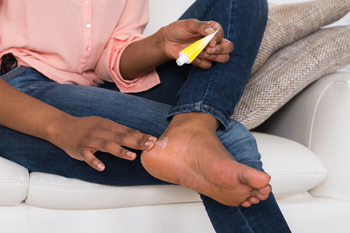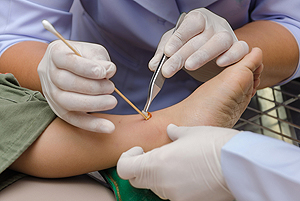Items filtered by date: January 2022
What to Do With a DFU
A DFU, or diabetic foot ulcer, is an unfortunately frequent complication of diabetes. Caused by a combination of high blood glucose levels, poor circulation, nerve damage, and immune insufficiency, DFUs are dangerous wounds that can form on the feet. These wounds typically heal slowly and poorly, and so they often require medical care. It is suggested that you call your podiatrist if you have a DFU and notice any new pain, drainage, discoloration, swelling, foul odor, or dead tissue at the site of the ulcer. You also may wish to seek medical treatment if the DFU increases in size or depth, or if it doesn’t heal. Some treatments that may help at the doctor’s office include debridement to remove dead tissue, medicated bandages, off-loading using orthotics, and surgery. If you have diabetes, it is suggested that you be under the regular care of a podiatrist.
Wound care is an important part in dealing with diabetes. If you have diabetes and a foot wound or would like more information about wound care for diabetics, consult with one of our podiatrists from Pennsylvania. Our doctors will assess your condition and provide you with quality foot and ankle treatment.
What Is Wound Care?
Wound care is the practice of taking proper care of a wound. This can range from the smallest to the largest of wounds. While everyone can benefit from proper wound care, it is much more important for diabetics. Diabetics often suffer from poor blood circulation which causes wounds to heal much slower than they would in a non-diabetic.
What Is the Importance of Wound Care?
While it may not seem apparent with small ulcers on the foot, for diabetics, any size ulcer can become infected. Diabetics often also suffer from neuropathy, or nerve loss. This means they might not even feel when they have an ulcer on their foot. If the wound becomes severely infected, amputation may be necessary. Therefore, it is of the upmost importance to properly care for any and all foot wounds.
How to Care for Wounds
The best way to care for foot wounds is to prevent them. For diabetics, this means daily inspections of the feet for any signs of abnormalities or ulcers. It is also recommended to see a podiatrist several times a year for a foot inspection. If you do have an ulcer, run the wound under water to clear dirt from the wound; then apply antibiotic ointment to the wound and cover with a bandage. Bandages should be changed daily and keeping pressure off the wound is smart. It is advised to see a podiatrist, who can keep an eye on it.
If you have any questions, please feel free to contact one of our offices located in Plymouth Meeting and Ambler, PA . We offer the newest diagnostic and treatment technologies for all your foot care needs.
What Causes Cracked Heels?
 Cracked heels affect up to 20 percent of adults in the United States. Although cracked heels are not usually a major issue, they can become very painful. Common factors that can cause cracked heels include standing for long periods of time, using harsh soaps, walking barefoot, dry skin, and wearing shoes that aren’t supportive. Cracked heels can also be caused by medical issues, such as vitamin deficiencies, fungal infections, obesity, or pregnancy. Common methods to prevent cracked heels include wearing shoes that do support the heel and are not too tight. Tips for relieving cracked heels are to stay hydrated, use a foot cream, and avoid standing for too long in one period. It is suggested that anyone with persistent and painful cracked heels consult with a podiatrist for a proper treatment method.
Cracked heels affect up to 20 percent of adults in the United States. Although cracked heels are not usually a major issue, they can become very painful. Common factors that can cause cracked heels include standing for long periods of time, using harsh soaps, walking barefoot, dry skin, and wearing shoes that aren’t supportive. Cracked heels can also be caused by medical issues, such as vitamin deficiencies, fungal infections, obesity, or pregnancy. Common methods to prevent cracked heels include wearing shoes that do support the heel and are not too tight. Tips for relieving cracked heels are to stay hydrated, use a foot cream, and avoid standing for too long in one period. It is suggested that anyone with persistent and painful cracked heels consult with a podiatrist for a proper treatment method.
If the skin on your feet starts to crack, you may want to see a podiatrist to find treatment. If you have any concerns, contact one of our podiatrists from Pennsylvania. Our doctors can provide the care you need to keep you pain-free and on your feet.
Cracked Heels
It is important to moisturize your cracked heels in order to prevent pain, bleeding, and infection. The reason cracked heels form is because the skin on the foot is too dry to support the immense pressure placed on them. When the foot expands, the dry skin on the foot begins to split.
Ways to Help Heal Them
- Invest in a good foot cream
- Try Using Petroleum Jelly
- Ease up on Soaps
- Drink Plenty of Water
Ways to Prevent Cracked Heels
- Moisturize After Showering
- Skip a Shower
- Keep Shower Water Lukewarm
- Don’t Scrub Your Feet
If you are unsure how to proceed in treating cracked heels, seek guidance from a podiatrist. Your doctor will help you with any questions or information you may need.
If you have any questions, please feel free to contact one of our offices located in Plymouth Meeting and Ambler, PA . We offer the newest diagnostic and treatment technologies for all your foot care needs.
Plantar Warts Can Be Treated!
Ankle Osteoarthritis
Osteoarthritis (OA) is a disease caused by wear and tear of the joints. While any joint can be afflicted with arthritis, it often affects the small joints of the feet and the ankle joint. Those with OA in their ankles may experience joint pain, swelling, stiffness, and redness. The joint may have a restricted range of motion, making walking or going about your daily activities more difficult. Some people may also notice a squeaking noise or a crunching sensation when moving the affected joint. Osteoarthritis is very common, affecting 15% of the world’s population. Of that 15%, approximately 1% have ankle OA. If you are experiencing symptoms of osteoarthritis in your feet or ankles, it is suggested that you schedule an appointment with a podiatrist near you.
Arthritis can be a difficult condition to live with. If you are seeking treatment, contact one of our podiatrists from Pennsylvania. Our doctors can provide the care you need to keep you pain-free and on your feet.
Arthritic Foot Care
Arthritis is a term that is commonly used to describe joint pain. The condition itself can occur to anyone of any age, race, or gender, and there are over 100 types of it. Nevertheless, arthritis is more commonly found in women compared to men, and it is also more prevalent in those who are overweight. The causes of arthritis vary depending on which type of arthritis you have. Osteoarthritis for example, is often caused by injury, while rheumatoid arthritis is caused by a misdirected immune system.
Symptoms
- Swelling
- Pain
- Stiffness
- Decreased Range of Motion
Arthritic symptoms range in severity, and they may come and go. Some symptoms stay the same for several years but could potentially get worse with time. Severe cases of arthritis can prevent its sufferers from performing daily activities and make walking difficult.
Risk Factors
- Occupation – Occupations requiring repetitive knee movements have been linked to osteoarthritis
- Obesity – Excess weight can contribute to osteoarthritis development
- Infection – Microbial agents can infect the joints and trigger arthritis
- Joint Injuries – Damage to joints may lead to osteoarthritis
- Age – Risk increases with age
- Gender –Most types are more common in women
- Genetics – Arthritis can be hereditary
If you suspect your arthritis is affecting your feet, it is crucial that you see a podiatrist immediately. Your doctor will be able to address your specific case and help you decide which treatment method is best for you.
If you have any questions, please feel free to contact one of our offices located in Plymouth Meeting and Ambler, PA . We offer the newest diagnostic and treatment technologies for all your foot care needs.
Choosing the Right Shoes for Toddlers
 It’s important to know that shoes for toddlers and shoes for older children are not the same. The final foot bone is only beginning to form at about 3 years of age, and feet will not be fully developed until the teen years. It’s wise to choose shoes for toddlers that offer proper support, and make sure the child’s feet are accurately measured in both length and width. Although the shoes should be lightweight, they also should have a sturdy, flat sole. Because a small child’s foot grows so rapidly, it is suggested to replace shoes every three months to ensure they fit correctly. Seeing a podiatrist for information on the best shoes for your baby is recommended.
It’s important to know that shoes for toddlers and shoes for older children are not the same. The final foot bone is only beginning to form at about 3 years of age, and feet will not be fully developed until the teen years. It’s wise to choose shoes for toddlers that offer proper support, and make sure the child’s feet are accurately measured in both length and width. Although the shoes should be lightweight, they also should have a sturdy, flat sole. Because a small child’s foot grows so rapidly, it is suggested to replace shoes every three months to ensure they fit correctly. Seeing a podiatrist for information on the best shoes for your baby is recommended.
The health of a child’s feet is vital to their overall well-being. If you have any questions regarding foot health, contact one of our podiatrists of Pennsylvania. Our doctors can provide the care you need to keep you pain-free and on your feet.
Tips for Keeping Children's Feet Healthy
- Make sure their shoes fit properly
- Look for any signs of in-toeing or out-toeing
- Check to see if they have Clubfoot (condition that affects your child’s foot and ankle, twisting the heel and toes inward) which is one of the most common nonmajor birth defects.
- Lightly cover your baby’s feet (Tight covers may keep your baby from moving their feet freely, and could prevent normal development)
- Allow your toddler to go shoeless (Shoes can be restricting for a young child’s foot)
- Cut toenails straight across to avoid ingrown toenails
- Keep your child’s foot clean and dry
- Cover cuts and scrapes. Wash any scratches with soap and water and cover them with a bandage until they’ve healed.
If you have any questions, please feel free to contact one of our offices located in Plymouth Meeting and Ambler, PA . We offer the newest diagnostic and treatment technologies for all your foot care needs.



